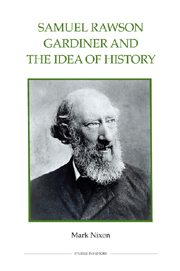Summary
Richard Hooker and Francis Bacon were crucial elements in Gardiner's understanding of the early seventeenth century. Bacon was a very different kind of public figure from Hooker, a politician and lawyer whose slow rise through the ranks of the servants of the state led him, eventually, to the post of lord chancellor to James I in 1618. In 1621, however, he was accused and convicted of bribery and thus fell from his lofty position. He died five years later having spent the intervening time continuing the literary and philosophical studies that he had begun in the 1580s. These works – most notably the Advancement of learning (1605) and the Novum organum (1620) – constitute some of the most important British philosophy of the early modern period. On the surface very different men, Bacon and Hooker may be considered two of the most powerful and influential thinkers of their age, while also two of the most important figures in the development of the early modern state. Thus, just as Hooker was treated by Gardiner as a central figure in his work, subject to both the historian's respect and his close literary, philosophical and historical scrutiny, so too was Bacon worthy of admiration and careful analysis. A study of his writings on Hooker provides an appreciation of Gardiner's unique understanding of religion; similarly a discussion of his account of Bacon will go some way towards uncovering his understanding of politics.
- Type
- Chapter
- Information
- Samuel Rawson Gardiner and the Idea of History , pp. 97 - 120Publisher: Boydell & BrewerPrint publication year: 2011



